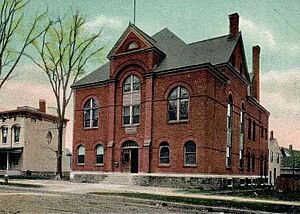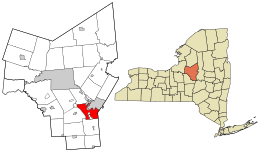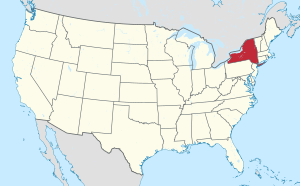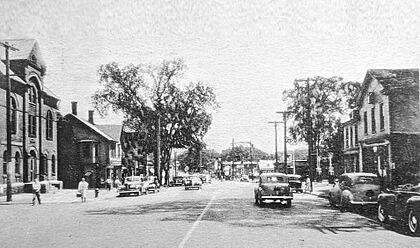New Hartford, New York facts for kids
Quick facts for kids
New Hartford, New York
|
|
|---|---|

Butler Hall was built in 1890. The historic building houses the Village of New Hartford municipal offices.
|
|

Location in Oneida County and the state of New York.
|
|

Location of New York in the United States
|
|
| Country | United States |
| State | New York |
| County | Oneida |
| Area | |
| • Total | 25.53 sq mi (66.13 km2) |
| • Land | 25.42 sq mi (65.82 km2) |
| • Water | 0.12 sq mi (0.31 km2) |
| Population
(2020)
|
|
| • Total | 21,874 |
| • Density | 860.67/sq mi (332.31/km2) |
| Time zone | EST |
| • Summer (DST) | EDT |
| FIPS code | 36-065-50309 |
New Hartford is a town in Oneida County, New York, United States. In 2020, about 21,874 people lived there. The town got its name from a family of early settlers who came from Hartford, Connecticut.
The Town of New Hartford includes a village also called New Hartford. It is the biggest suburb of Utica, which is just north of the town and village.
Contents
History of New Hartford
New Hartford was first settled in March 1788. A man named Jedediah Sanger moved to the area after losing his farm in New Hampshire to a fire.
Sanger's Land Purchase
Jedediah Sanger bought land in the area. Early stories say he bought 1,000 acres for 50 cents an acre. This land was part of the Town of Whitestown. He then sold some of it to Joseph Higbee.
Later research of old property records suggests the story might not be fully accurate. Deeds show Sanger bought land for a bit more per acre. He also sold some of it for slightly less than he paid. Even with these details, the original story is still often told today.
Other Land Areas
Today, New Hartford covers over 16,000 acres. This is much more than Sanger's first purchases. The land came from several large land grants, called Patents. These included:
- Cosby's Manor: 22,000 acres given in 1734.
- Sadaqueda (Sauquoit) Patent: 48,000 acres given in 1736.
- Coxe Patent: 76,000 acres given in 1770. After the American Revolution, parts of this land were owned by famous people like General George Washington.
- Bayard Patent: 50,000 acres given in 1771.
Early Settlers and Community Life
In 1789, Jedediah Sanger moved his family to the settlement. He built a sawmill and a gristmill, which used the Sauquoit Creek for power.
Other early settlers arrived from Connecticut and New Hampshire. These included:
- General Oliver Collins, a Revolutionary War veteran.
- Eli Butler, who arrived in 1789.
- John French and Colonel Nathan Seward, also Revolutionary War veterans.
Many other families also helped build the community. The first child born to the settlers was Uriel H. Kellogg.
Forming the Town of New Hartford
The Town of New Hartford was officially created on April 12, 1827. It was formed from a larger area called the Town of Whitestown. Whitestown used to cover all of New York state west of Herkimer.
The first town meeting was held on April 24, 1827. People voted for important roles like town supervisor and town clerk. Seven years later, the town grew bigger by adding a piece of the Town of Kirkland.
New Hartford Village History
Many factories and businesses started in New Hartford during the 1800s.
The Village of New Hartford became its own official village in 1870. This happened after a vote by the people living there.
Early Businesses and Trade
New Hartford had many types of factories and businesses:
- Carpets: The first ingrain carpets in New York state were made here. Ingrain carpets are reversible, flat carpets popular long ago.
- Nails: The first cut nails in the state were made from iron hoops of old wine barrels.
- Tanneries: These were places where animal hides were turned into leather.
- Paper and Textiles: Factories made paper, cotton cloth, and knitted fabrics.
Most early factories used the power of the Sauquoit Creek. This made New Hartford a busy manufacturing center. For a while, it had more businesses than even Utica. Later, many factories switched to steam power.
The Seneca Turnpike also helped New Hartford grow. This was a toll road connecting Utica to western New York. Jedediah Sanger helped route the turnpike through New Hartford. This brought a lot of traffic and business. However, when the Erie Canal was built through Utica, much of the cross-state traffic moved there. Utica then grew into a large city, and New Hartford became its suburb.
Education in New Hartford
Most students in New Hartford attend schools in the New Hartford Central School District. Some parts of the town are in the Clinton Central School District or Sauquoit Valley Central School District.
Schools in the New Hartford district include:
- Elementary Schools
- Bradley Elementary School
- E.R. Hughes Elementary School
- Robert E. Myles Elementary School
- Secondary Schools
- Ralph W. Perry Junior High School
- New Hartford Senior High School
Geography and Location
New Hartford covers about 25.5 square miles (66 square kilometers). Most of this area is land, with a small amount of water.
The eastern border of the town is shared with the towns of Litchfield and Frankfort in Herkimer County.
Historic Places to Visit
One important historic building in New Hartford is listed on the National Register of Historic Places. It is:
- St. Stephen's Church
Population and People
| Historical population | |||
|---|---|---|---|
| Census | Pop. | %± | |
| 1830 | 3,599 | — | |
| 1840 | 3,819 | 6.1% | |
| 1850 | 4,847 | 26.9% | |
| 1860 | 4,395 | −9.3% | |
| 1870 | 4,037 | −8.1% | |
| 1880 | 4,394 | 8.8% | |
| 1890 | 5,005 | 13.9% | |
| 1900 | 5,230 | 4.5% | |
| 1910 | 5,947 | 13.7% | |
| 1920 | 8,646 | 45.4% | |
| 1930 | 7,121 | −17.6% | |
| 1940 | 8,109 | 13.9% | |
| 1950 | 11,071 | 36.5% | |
| 1960 | 18,444 | 66.6% | |
| 1970 | 21,430 | 16.2% | |
| 1980 | 21,286 | −0.7% | |
| 1990 | 21,640 | 1.7% | |
| 2000 | 21,172 | −2.2% | |
| 2010 | 22,166 | 4.7% | |
| 2020 | 21,874 | −1.3% | |
| U.S. Decennial Census | |||
In 2000, there were 21,172 people living in New Hartford. About 8,601 households and 5,625 families lived in the town. The population density was about 834 people per square mile.
Most people in New Hartford are White (96.03%). Other groups include Asian (2.34%), Black or African American (0.80%), and Native American (0.10%). About 0.73% of the population was Hispanic or Latino.
About 27.7% of households had children under 18. The average household had 2.34 people. The average family had 2.94 people.
The median age in the town was 45 years old. About 21.7% of the population was under 18. About 23.7% were 65 or older.
The median income for a household was $45,991. For families, it was $60,843. About 5.0% of the population lived below the poverty line. Many residents (42%) aged 25 and older have a college degree.
Communities and Locations in New Hartford
New Hartford includes several smaller communities:
- Chadwicks – A small community near the southern border of the town.
- New Hartford – The main village in the eastern part of the town.
- Washington Mills – A community south of New Hartford village, located on NY 8.
- New York Mills – A village that is partly in New Hartford and partly in the town of Whitestown.
Notable People from New Hartford
Many interesting people have connections to New Hartford:
- Waleed Abdalati: A former NASA Chief Scientist.
- Derek Bard: A professional golfer.
- Joe Bonamassa: A famous blues rock guitarist and singer.
- Joel de la Fuente: An actor.
- Chuck Garvey and Al Schnier: Guitarists in the band moe.
- Grace Lin: A children’s book author.
- Frederick S. Martin: A former US Congressman.
- Roswell B. Mason: Was the Mayor of Chicago during the Great Chicago Fire of 1871.
- William John Murphy: The founder of the city of Glendale, Arizona.
- Henry Palmer: A surgeon in the Union Army during the Civil War.
- James Wilson Seaton: A lawyer and legislator from Wisconsin.
- Claudia Tenney: A lawyer, publisher, and politician.
- Maria Van Kerkhove: An expert in infectious diseases at the World Health Organization (WHO).
- Andy Van Slyke: A retired Major League Baseball player and coach.
- William Williams: A printer and publisher.
- Mike Zalewski: A professional hockey player.
- Steven Zalewski: A professional hockey player.
See also
 In Spanish: New Hartford (Nueva York) para niños
In Spanish: New Hartford (Nueva York) para niños


